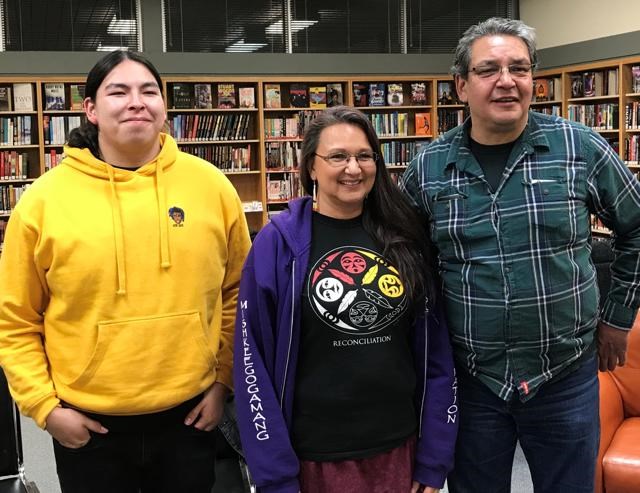Around 40 Weyburn and area residents gathered into a large “talking circle” on the upper level of the Weyburn Public Library, and took part in a KAIROS blanket exercise on Wednesday evening. In the first photo, the blankets are set out just prior to the start of the exercise, as the participants and facilitators prepared to take part.
Led by Elder Tim Poitras, and two facilitators, his grandson Chris McDougall and Diane Campeau, participants were taken through a narrative that laid out the history of the First Nations peoples of North America and the subsequent impact of colonization by Europeans.
The KAIROS Blanket Exercise program is a unique, participatory history lesson – developed in collaboration with Indigenous Elders, knowledge keepers and educators – that fosters truth, understanding, respect and reconciliation among Indigenous and non-indigenous peoples.
A series of blankets were arranged on the floor in the centre of the circle, and all of the participants stood on them, representing all of the aboriginal peoples and tribes.
McDougall read the historical narrative, with participants reading out supplementary quotes and information, and as they moved through the historical record, the blankets got smaller and smaller, representing the loss of the aboriginal peoples lands.
A large number of the participants had to sit down when the history reached the point where tuberculosis, smallpox and other European diseases began to decimate the First Nations, along with the loss of their lands as they were forced onto small reserves, lost their freedom and ability to hunt and fish as they had always been able to do.
Interspersed with the historical narrative were personal observations and experiences from Poitras, who noted he is a fourth-generation residential school survivor. Campeau is a 60s scoop survivor, and she shared some of her own experiences as well as she is now raising a 12-year-old daughter without any connection to her birth family.
At the conclusion of the exercise, which followed the history to the present day, including the efforts begun towards truth and reconciliation between the Indigenous and non-indigenous people, a debriefing was held, where a small pebble was passed around the circle and each person shared what the exercise meant to them, and what they would do with what they learned.
Every participant spoke about the impact the exercise made on them, and many expressed the desire to share the knowledge and the stories with others to spread more understanding about what Canada’s Indigenous peoples have gone through and are still facing today.
Mayor Marcel Roy, who was one of the participants, said, “Reconciliation starts at the grassroots. It won’t go anywhere unless it starts here.”
One participant, who came from Regina to take part in the exercise, said he wants to tell his children that it’s all right to be Metis, and noted he was told for most of his life that it was not all right.
Another participant said she felt “flooded” by all of the information, and noted it was “very profound”.
See the Feb. 5 edition of the Weyburn Review for more comments and observations from the blanket exercise.



